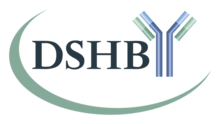Developmental Studies Hybridoma Bank
 | |
| Founded | 1986 |
|---|---|
| Type | Non-profit organization, Biological resource center |
| Location |
|
| Services | Bank and distribute hybridomas and cell products |
The Developmental Studies Hybridoma Bank (DSHB) is a non-profit, global hybridoma bank. The DSHB is a National Resource established by the National Institute of Child Health and Human Development (NICHD) to bank and distribute at cost hybridomas and cell products to the general scientific community.
Mission
The mission of the DSHB is four-fold:
- Keep product prices low to facilitate research (Currently 35.00 USD per ml of supernatant)
- Serve as a repository to relieve scientists of the time and expense of distributing hybridomas and the monoclonal antibodies (MAbs) they produce
- Assure the scientific community that MAbs with limited demand remain available
- Maintain the highest product quality, provide prompt customer service and knowledgeable technical assistance.
Description
The DSHB is directed by David R. Soll at the University of Iowa. There are currently over 3000 hybridomas in the DSHB collection.[1] They have obtained hybridoma collections from a variety of individuals and institutions including the Muscular Dystrophy Association, the National Cancer Institute, the NIH Common Fund, and the European Molecular Biology Laboratory (EMBL) and they eagerly await new collections. The DSHB has begun developing complex monoclonal antibody microarrays for specific cancer targets. First time customers must agree to the DSHB terms of usage that products will be used for research purposes only, and that they cannot be commercialized or distributed to a third party. Researchers also agree to acknowledge both the DSHB and the contributing investigator in publications that benefit from the use of DSHB products and provide the DSHB citations of all publications. Individuals or institutions can deposit hybridomas for distribution and archiving at no cost, and there is no maximum or minimum deposit. As the depositor, you have the option to allow the DSHB to distribute the hybridoma cells, or just the cell products. All contributions to the DSHB do not preclude the depositor from licensing cell lines for commercial purposes. The DSHB does not own any intellectual property on deposited antibodies. The intellectual property remains that of the scientist or institution that banks the hybridomas. As a non-profit organization, the DSHB covers the operating costs of maintaining, improving and producing products in the collection by selling the products at cost.
History
The DSHB was created in 1986 by the Institute of Child Health and Human Development (NIH) to bank and distribute hybridomas and the monoclonal antibodies (MAbs) they produce to the general scientific community in order to facilitate research. The DSHB has been self-funded since 1996. One of the first hybridomas deposited with the DSHB was MF 20 which recognizes all isoforms of skeletal myosin heavy chain. In April 1986, Dr. Donald Fischman, Cornell Medical School, deposited MF 20 with the DSHB. Nearly 30 years later, MF 20 remains one of the top ten most requested monoclonal antibodies.
Popular Collections
Popular targets that the DSHB provides products for include:
- GFP
- Drosophila antigens
- Cell markers
- Dictyostelium antigens
- Cytoskeletal elements
- Transcription factors
- Cluster Determinant (CD) antigens
- Muscular Dystrophy-associated proteins
- NCI – Cancer targets
- Neurodevelopment markers
- Cardiac development proteins
- Extracellular matrix proteins
- Cell adhesion receptors
- Cell signaling
- Epitope tags
- Stem cells
- Skeletal muscle
- Enzymes
- Human
- C. elegans
- Xenopus
- Nucleus
- Microbes (viruses, bacteria, fungi)
- Fusion Protein Tags
- NIH Protein Capture Reagents
Noteworthy Depositors
Nobel Prize and Alfred P. Sloan, Jr. Prize winner J. Michael Bishop deposited the anti c-MYC hybridoma 9e10 [2]
Nobel Prize winner Sir John Gurdon deposited MyoD clone D7F2[3]
Nobel Prize winner Eric F. Wieschaus deposited 7 hybridomas[4]
National Academy of Sciences Members who have deposited hybridomas
- Philip A. Beachy (5 hybridoma deposits) Stanford University
- Seymour Benzer (7 hybridoma deposits) California Institute of Technology
- J. Michael Bishop (1 hybridoma deposits) University of California, San Francisco
- Kevin P. Campbell (9 hybridoma deposits) The University of Iowa
- Constance L. Cepko (1 hybridoma deposit) Harvard University
- John Gurdon (1 hybridoma deposit) University of Cambridge
- Corey S. Goodman (25 hybridoma deposits) University of California, Berkeley
- Thomas M. Jessell (36 hybridoma deposits) Columbia University
- N. M. Le Douarin (6 hybridoma deposits) CNRS Institute of Embryology, France
- Gerald M. Rubin (20 hybridoma deposits) HHMI / Janelia Farm Research
- Joshua R. Sanes (11 hybridoma deposits) Harvard University
- S. J. Singer (1 hybridoma deposit) University of California, San Diego
- Roland Nusse (2 hybridoma deposits) Stanford University
- Timothy A. Springer (7 hybridoma deposits) Harvard University
- Masatoshi Takeichi (7 hybridoma deposits) RIKEN, Japan
- Stephen T. Warren (1 hybridoma deposit) Emory University
- Zena Werb (1 hybridoma deposit) University of California, San Francisco
- Eric F. Wieschaus (7 hybridoma deposits) Princeton University
The National Cancer Institute deposited 546 Monoclonal antibodies from the Protein Capture Reagents Program.